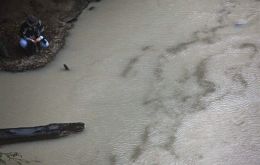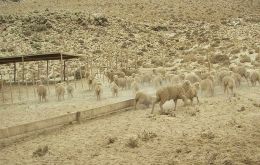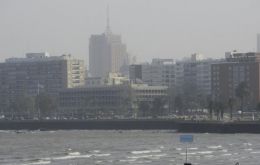MercoPress. South Atlantic News Agency
Environment
-
Monday, June 13th 2011 - 23:37 UTC
Millions of farm-salmon in south Chile moved because of the volcanic eruption

Chile’s National Fisheries Service (Sernapesca) authorized the transfer of more than five million salmon from three farms in the south of the country. The decision was taken as a precautionary measure because of the eruption of the Puyehue-Cordón Caulle volcanic range and possible pollution of rivers and lakes.
-
Monday, June 13th 2011 - 22:55 UTC
Falklands/UK airbridge remains on hold because of the ash cloud

The next UK/Falkland Islands airbridge flight remains uncertain, following the recent disruption caused by the volcanic eruption in Chile it was reported by the Falklands radio station.
-
Monday, June 13th 2011 - 22:40 UTC
River Plate airports with no air traffic until Tuesday morning

A remnant of volcanic ashes spewed by the Chilean volcano Puyehue over a week ago and which continues to hover over the River Plate again interrupted Monday activities in the three main airports, Carrasco in Montevideo and Ezeiza and Aeroparque in the city of Buenos Aires.
-
Monday, June 13th 2011 - 16:20 UTC
Agriculture emergency is Argentine Patagonia because of the volcanic ash

The Argentine government is expected to announce Monday an agriculture emergency in several Patagonian areas as a consequence of the Chilean Andes volcanic eruption that has covered most of the territory with a blanket of ash leaving thousands of sheep with no water or pasture.
-
Monday, June 13th 2011 - 11:37 UTC
Volcanic ash cloud reaches New Zealand and Australia

A cloud of ash from an erupting volcano in Chile has drifted over the Atlantic and Indian oceans to lie over southern parts of New Zealand and Australia, prompting the cancellation of dozens of flights.
-
Saturday, June 11th 2011 - 11:04 UTC
Chile’s volcanic eruption devastates regions fishing; threatens cattle and tourism

A week’s ago volcanic eruptions in Chile’s South have crippled the fresh-water fishing industry there and potentially threaten the cattle industry, too.
-
Saturday, June 11th 2011 - 10:38 UTC
Successful launching of Argentine/NASA satellite to map oceans’ surface salinity

The joint Argentine/US satellite Aquarius/SAC-D (Satellite de Aplicaciones Cientaficas) mission was successfully launched Friday from Vandenberg military air base in California. Argentine president Cristina Fernandez de Kirchner said the Argentines “on this day should feel happy and proud”.
-
Saturday, June 11th 2011 - 09:38 UTC
Flights from Buenos Aires and Montevideo airports gradually begin to normalize

As the volcanic ash cloud begun dissipating airlines operating from the airports of Buenos Aires, Montevideo, and the south of Brazil resumed some flights Friday afternoon but it will take several days to be back to normal as companies reprogram backlogs.
-
Friday, June 10th 2011 - 16:33 UTC
Falklands rations seats on the UK airbridge forced by the volcanic ash

The impact of the volcanic ash is straining the Falkland Islands air links with the United Kingdom forcing the rationing of seats for northbound passengers because of the repeated cancelling of the airbridge with Brize Norton.
-
Friday, June 10th 2011 - 05:55 UTC
The South Cone and Falklands remain under the volcanic ash cloud

Uruguay, most of Argentina, the south of Chile and even the Falkland Islands is the South Atlantic are suffering the consequences of the volcanic ash cloud that remains hovering over the region forcing airlines to cancel flights until further notice.
